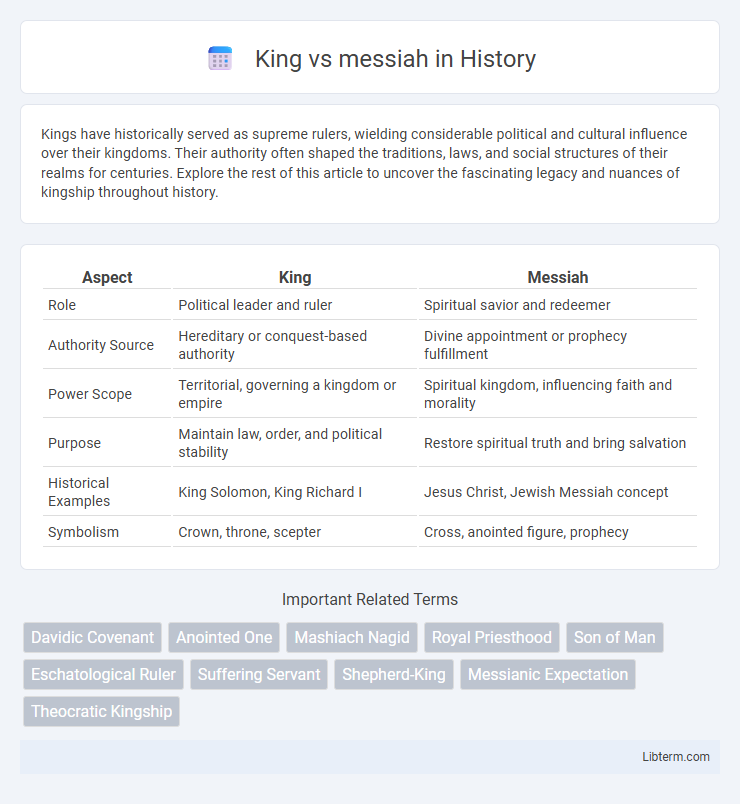Kings have historically served as supreme rulers, wielding considerable political and cultural influence over their kingdoms. Their authority often shaped the traditions, laws, and social structures of their realms for centuries. Explore the rest of this article to uncover the fascinating legacy and nuances of kingship throughout history.
Table of Comparison
| Aspect | King | Messiah |
|---|---|---|
| Role | Political leader and ruler | Spiritual savior and redeemer |
| Authority Source | Hereditary or conquest-based authority | Divine appointment or prophecy fulfillment |
| Power Scope | Territorial, governing a kingdom or empire | Spiritual kingdom, influencing faith and morality |
| Purpose | Maintain law, order, and political stability | Restore spiritual truth and bring salvation |
| Historical Examples | King Solomon, King Richard I | Jesus Christ, Jewish Messiah concept |
| Symbolism | Crown, throne, scepter | Cross, anointed figure, prophecy |
Defining King and Messiah: Key Differences
A King is a secular ruler who holds political power, governs a nation, and typically inherits authority through lineage or conquest. A Messiah, in religious contexts, is a divinely anointed figure prophesied to bring salvation, restore spiritual order, and deliver humanity from sin or oppression. The key difference lies in the King's earthly dominion versus the Messiah's spiritual mission and divine mandate.
Historical Roots of Kingship and Messianic Ideals
Kingship historically embodied centralized political authority and divine sanction, often inherited through lineage to maintain societal order and stability. Messianic ideals emerged from religious traditions, anticipating a divinely anointed figure who would bring salvation, justice, and restoration beyond mere political rule. These concepts intertwine in ancient texts, with kings sometimes portrayed as messianic figures embodying both worldly power and spiritual deliverance.
Kings in Ancient Traditions and Scriptures
Kings in ancient traditions and scriptures often symbolize earthly authority and governance, embodying leadership roles sanctioned by divine right or ancestral lineage. Biblical figures like King David exemplify the archetype of a ruler chosen by God to lead and protect their people, establishing justice and order. These kings are frequently depicted with an emphasis on their earthly dominion, political power, and responsibilities to both their subjects and deities.
The Messianic Concept Across Cultures
The Messianic concept across cultures embodies a divinely anointed figure destined to restore harmony and justice, often transcending the political authority of a king who rules primarily through hereditary power. While kings represent temporal leadership grounded in specific dynasties, messiahs symbolize spiritual salvation and universal deliverance, appearing in traditions such as Judaism, Christianity, Islam, and various indigenous beliefs. This cross-cultural theme highlights a savior archetype whose mission integrates prophetic insight, moral renewal, and eschatological hope distinct from conventional monarchy.
Authority and Power: King vs Messiah
A king derives authority and power through hereditary succession and political governance, often exerting control over land, laws, and military forces to maintain sovereignty. In contrast, a messiah's authority is rooted in divine anointment and spiritual mission, emphasizing moral leadership, salvation, and transformative influence over followers rather than temporal dominion. The king's power is institutional and secular, while the messiah's authority is transcendent and based on fulfilling prophetic and redemptive roles.
Spiritual versus Political Leadership
A king traditionally embodies political leadership, wielding authority over a nation or territory with a focus on governance, law, and military power. A messiah represents spiritual leadership, often viewed as a divinely anointed figure whose mission centers on salvation, moral guidance, and transforming the spiritual lives of followers. The distinction highlights the king's emphasis on temporal power versus the messiah's role in transcending worldly rule to foster spiritual awakening and redemption.
Prophetic Expectations: Messiah in Religious Thought
Prophetic expectations of the Messiah in religious thought emphasize a divinely anointed figure who fulfills God's covenant by bringing salvation, justice, and peace to humanity. Unlike a traditional king who rules over a kingdom with political authority, the Messiah is often portrayed as a spiritual leader embodying righteousness and God's ultimate plan for redemption. Sacred texts such as the Hebrew Bible and Christian New Testament highlight prophecies describing the Messiah's role in restoring Israel and establishing a new era of divine harmony.
Kingship and Messianism in Modern Context
Modern kingship often symbolizes sovereign authority, national identity, and constitutional governance, contrasting with messianism, which represents spiritual deliverance and transformative hope. Messianic expectations persist in contemporary societies through movements promising radical change rooted in prophetic tradition, while kingship adapts to democratic principles and ceremonial roles. The interplay between the symbolic power of monarchs and messianic ideals reflects ongoing debates about leadership, legitimacy, and societal renewal in global politics.
Symbolism and Legacy: King and Messiah Today
The symbolism of King centers on authority, governance, and temporal power, often representing leadership and societal order, while the Messiah embodies spiritual salvation, hope, and divine intervention in human affairs. The legacy of the King is evident in political institutions, royal traditions, and national identity, whereas the Messiah's influence permeates religious beliefs, moral values, and cultural narratives of redemption. Today, both figures inspire movements and ideologies, shaping collective consciousness through their distinct yet overlapping archetypes in history and culture.
King vs Messiah: Relevance in Contemporary Society
The distinction between King and Messiah remains relevant in contemporary society as the King symbolizes secular authority and governance, while the Messiah embodies spiritual salvation and hope for redemption. Modern leadership often blends these roles, reflecting society's need for both political stability and moral guidance. This duality influences current debates on power, legitimacy, and the interplay between religion and state.
King Infographic

 libterm.com
libterm.com